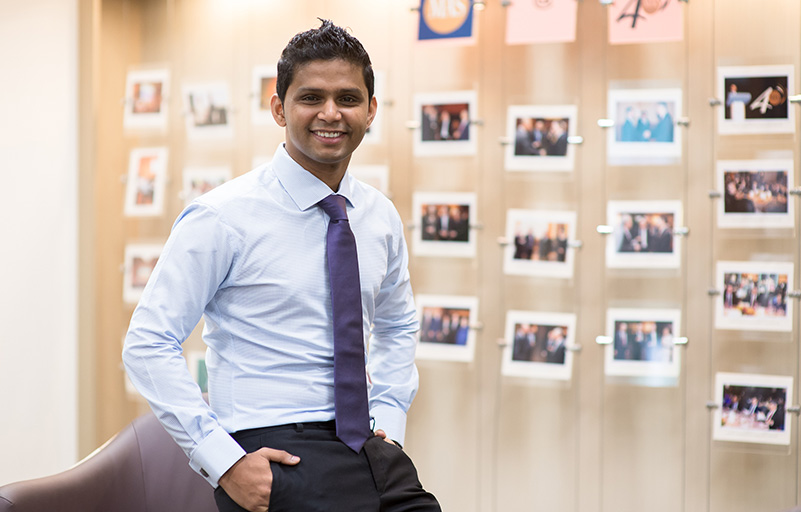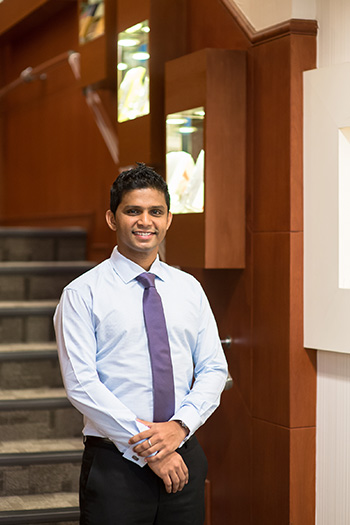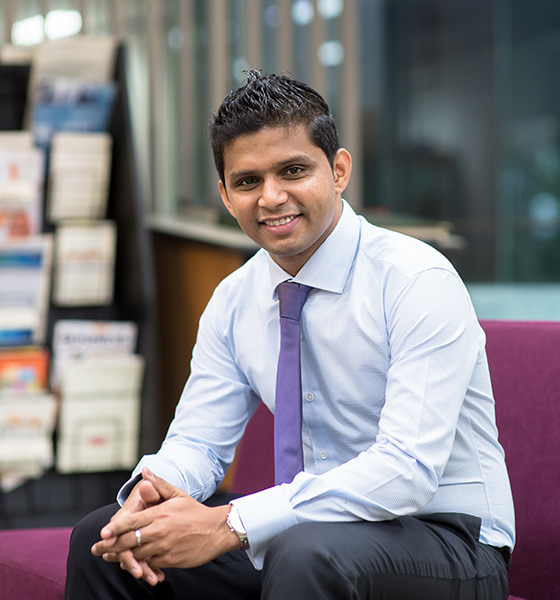MAS is more than Singapore’s central bank. With the authority to regulate Singapore’s financial services sector and act as a banker to and financial agent of the Singapore Government, MAS is responsible for promoting monetary stability and implementing credit and exchange policies conducive to the growth of the economy.
For 31-year-old MAS Undergraduate scholar Nagutha Mohamed Faiz, his interest in monetary policy was first piqued when he was exposed to the subject in Junior College. “I realised that Singapore has quite a unique approach towards monetary policy. For instance, we utilise the exchange rate of our currency as a policy tool instead of the interest rate,” he recalls.
Now a Senior Economist in MAS’s Economic Policy Group, Faiz has had more than five years of experience examining the economic and public policy issues facing Singapore. He tells us about his role in MAS and the unique insights he has gained from his front-row view of the workings of the Singapore economy.
Surveilling the Economy
Faiz now works in the Economic Policy Group, where he conducts research on the Singapore economy. He delves into greater detail, explaining, “I look at both individual sectors and the domestic economy as a whole. My job consists of day-to-day monitoring of the economy and various long-term projects including the study of the ongoing structural changes in the economy and their various implications.

Nagutha Mohamed Faiz
MAS Undergraduate Scholar
Designation: Senior Economist, Economic Policy Group, Domestic Economy Division
Studied: Master of Science in Economics,
London School of Economics, UK
Bachelor of Arts in Economics and Management,
Oxford University, UK
“I am also involved in economic forecasting, where we look ahead and attempt to identify economic trends and prospects going into the future. And given the ongoing restructuring of the Singapore economy towards productivity-driven growth, I look at the challenges we need to overcome in order to re-tool our economy for more sustainable growth. This is critical as our population ages and the labour force growth slows.”
MAS also makes every effort to expose its employees to the diverse functions within the organisation, giving them the opportunities to chart their own career paths and progression. “I was allowed to work on different tasks in the Economic Policy Group and have regular check-ins with my superiors to discuss my own development and projects. I am glad to be able to have a say in my learning process,” he tells us.
An Exciting Learning Journey
And although his university days may seem quite far behind him now, the London School of Economics (LSE) and Oxford University alumnus still recalls the support MAS gave him when he was a student. He shares, “MAS supported me in my decision to seek external internships during my summer breaks. I wanted to widen my work exposure and managed to secure internships at two banks in London – Citi and Merrill Lynch. These experiences provided me with valuable insights into the wide range of functions undertaken by banks and I also learnt much about the inter-connectedness of the global financial system.”
MAS has always been ready to offer support and guidance at every step of Faiz’s higher education. He says, smiling, “When I was pursuing my Master’s degree in Economics at LSE, I needed some help and advice in selecting my courses. MAS was quick to put me in touch with some of its economists who had previously pursued a Master’s degree at LSE as well.

“MAS also gave me considerable freedom to choose my courses. For example, while it might have seemed obvious to pursue a course in monetary economics, I was instead free to choose a course in industrial organisation out of pure interest!”
Upon joining MAS, Faiz has continued to reap the benefits of the multitude of developmental opportunities that MAS offers. He shares, “I took a five-week trip to the International Monetary Fund in 2012 to learn more about the Fund’s financial programming policies. I’ve also had plenty of opportunities to attend courses that have helped to hone my communication and leadership skills.”
To add on, Faiz joined MAS at a time when the global economy was being rocked by a succession of crises and shocks. From the Dubai sovereign debt crisis to the afflictions of the Eurozone, the global economy suffered multiple shocks that hindered its ability to recover and stood in the way of sustained growth.
He adds, “The global financial crisis really brought monetary policy to the limelight, with many central banks around the world resorting to unconventional tools in their attempts to revive the flagging economy. And combined with our ongoing domestic restructuring efforts, these past few years have shaped up into extremely interesting and stimulating times for me.”
Faiz is unfazed by the challenges presented by a turbulent global economy. Instead, he notes that it has fostered in him a sense of resilience and taught him to prepare for the unexpected. He says candidly, “We cannot always trust in the stability of the system and must always prepare for unexpected shocks. Furthermore, we must not get too comfortable with the status quo as it could change at any time.”
Ample Room for Growth
Having enjoyed bountiful opportunities and unrivalled learning experiences, it’s no surprise that Faiz maintains that MAS is one of the best places to be an economist. He enthuses, “My training as an economist is hardly complete and there are still many areas to explore. As MAS is an organisation that performs so many diverse functions and encourages us to undertake new challenges, it is an exciting place to make a difference.”
Rounding off on an encouraging note, he concludes, “There have simply been too many memorable experiences at MAS for me. Future scholars can look forward to gaining valuable economic and financial insights, honing their skills in the various areas of policy and understanding the workings of the economy. They will be helped along the way by supportive peers and superiors who are always willing to share their knowledge and experiences, just as I was!”

